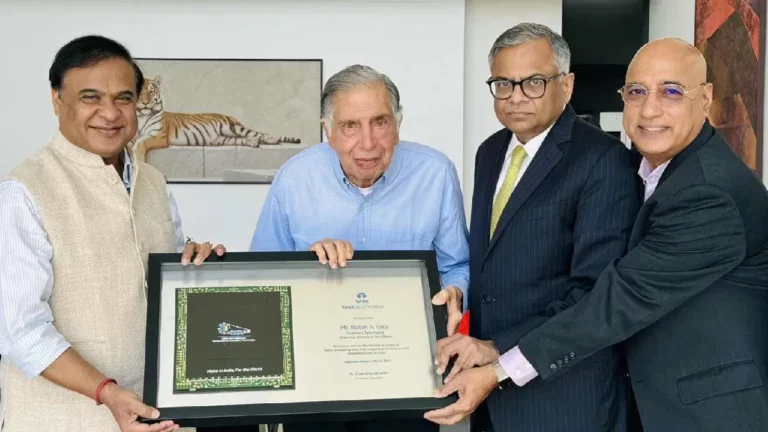Ratan Tata’s success story is a compelling narrative of visionary leadership, strategic innovation, and profound social impact. As the former chairman of the Tata Group, Tata’s career has been marked by transformative achievements that not only reshaped one of India’s largest conglomerates but also contributed significantly to the socio-economic development of India and beyond. Here’s an exploration of the key milestones and attributes that define Ratan Tata’s remarkable journey.
Early Life and Education
Born on December 28, 1937, in Mumbai, India, Ratan Naval Tata is the son of Naval Tata and the grandson of J.R.D. Tata, the legendary industrialist who founded the Tata Group. Ratan Tata’s early life was steeped in a legacy of excellence and leadership. He pursued his education in the United States, earning a degree in Architecture from Cornell University. His formative years abroad and exposure to diverse cultures and practices played a pivotal role in shaping his global perspective and innovative mindset.
Joining the Tata Group
Ratan Tata joined the Tata Group in 1962, starting his career as an assistant to the executive director. Despite his initial behind-the-scenes role, Tata’s impact was soon felt across the conglomerate. His journey from a junior position to the helm of one of India’s most prominent business groups was marked by a series of strategic and visionary moves.
Transformative Leadership
1. Revamping the Tata Group: Ratan Tata became the chairman of Tata Sons in 1991, succeeding his uncle J.R.D. Tata. Under his leadership, the Tata Group underwent a remarkable transformation. Tata focused on modernizing and expanding the conglomerate’s portfolio, driving it towards global markets. He emphasized diversification and innovation, leading to the acquisition of international brands and the establishment of a global presence.
2. Landmark Acquisitions: One of Tata’s most notable achievements was the acquisition of British steelmaker Corus in 2007 and the luxury carmaker Jaguar Land Rover in 2008. These strategic moves significantly expanded Tata Group’s global footprint and demonstrated Tata’s bold vision and willingness to invest in high-potential markets.
3. Tata Nano: Tata’s commitment to innovation was exemplified by the launch of the Tata Nano in 2008. Designed as the world’s cheapest car, the Nano was aimed at making automobile ownership accessible to India’s burgeoning middle class. Although the project faced challenges, it highlighted Tata’s dedication to addressing market needs and driving affordable innovation.
Commitment to Social Responsibility
Ratan Tata’s success is not solely defined by business achievements; his profound commitment to social responsibility is a cornerstone of his legacy. Under his leadership, the Tata Group reinforced its dedication to corporate social responsibility through various initiatives:
1. Philanthropy: The Tata Trusts, which manage a significant portion of the Tata Group’s wealth, have been at the forefront of various philanthropic efforts. Tata’s focus on education, healthcare, rural development, and disaster relief has led to substantial investments in improving the quality of life for millions of people in India.
2. Tata Cancer Hospital: A significant example of Tata’s philanthropic efforts is the Tata Memorial Hospital, which provides cancer treatment to thousands of patients annually, often free of charge. This institution underscores Tata’s commitment to advancing healthcare and supporting vulnerable communities.
Legacy and Retirement
Ratan Tata stepped down as chairman of the Tata Group in December 2012, passing the baton to Cyrus Mistry. However, Tata’s legacy continued to influence the company and beyond. His retirement marked the end of an era, but his impact remained evident through the ongoing projects and strategic directions he had set in motion.
Post-Retirement Activities
Even after his official retirement, Tata has remained active in various domains. His focus has shifted to mentorship, philanthropy, and supporting entrepreneurial ventures. He has been involved in various initiatives aimed at fostering innovation, supporting startups, and addressing social challenges.
Conclusion
Ratan Tata’s success story is a testament to the power of visionary leadership, strategic innovation, and deep-rooted social responsibility. His ability to lead one of India’s largest conglomerates through transformative changes, coupled with his unwavering commitment to societal betterment, has left an indelible mark on both the business world and society at large.
Tata’s journey from a young executive to a global business leader and philanthropist reflects a legacy of excellence that continues to inspire future generations. His story is not just about achieving business success but also about making a meaningful difference in the world—demonstrating that true success is defined by the positive impact one can make on others and society.
Ratan Tata Lates news:
Boeing planes once ruled Indian skies. IndiGo changed that
Indians who work spiritedly for ‘world is one’ mantra honoured
‘Mumbai, I need your help’: Ratan Tata appeals to find blood donor for stray dog
Tata Sons doubles royalty fee to Rs 200 crore
Ratan Tata once ditched meeting UK’s King Charles for THIS reason

